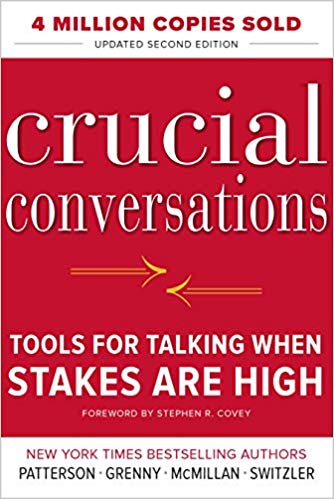

This article is an excerpt from the Shortform summary of "Crucial Conversations" by Kerry Patterson. Shortform has the world's best summaries of books you should be reading.
Like this article? Sign up for a free trial here .
What are some of the best quotes from Crucial Conversations? What are their context and meaning?
Crucial Conversations teaches you an array of dialogue principles and practical skills, explained and demonstrated through numerous examples. After reading this book, you’ll be able to talk to anyone about virtually any topic, no matter how sensitive.
Here is a selection of Crucial Conversations quotes with explanations.
3 Crucial Conversations Quotes to Consider
The following Crucial Conversations quotes highlight some of the key ideas from the book.
What makes each of these conversations crucial … is that the results could have a huge impact on the quality of your life.
Learning to master crucial conversations can boost your career. When you can address difficult topics effectively, you’ll be influential and effective at getting things done, and you’ll build strong relationships.
Crucial conversation skills can improve your organization. Having leaders and employees who skillfully handle crucial conversations can improve an organization’s performance, while poorly handled conversations and interactions can undercut it.
Handling tough conversations well can improve your relationships. The researchers found that helping couples hold crucial conversations more effectively reduced their chances for unhappiness or breakup by more than half.
The ability to master high-stakes crucial conversations contributes to a healthier and longer life. On the other hand, communication problems can exacerbate health problems, including immune system weakness, life-threatening diseases, and repressing negative emotions.
This is the first principle of dialogue—Start with Heart. That is, your own heart. If you can’t get yourself right, you’ll have a hard time getting dialogue right.
Learning dialogue skills starts with diligent self-examination because if you don’t understand yourself, you can’t be fully effective at dialogue.
In crucial conversations, you’ll revert to tactics you grew up with (debate, silent treatment, manipulation, etc.). You need to understand your tendencies in order to counteract them and learn new skills.
You also need to be able to see how you’re contributing to the problems you’re experiencing. In disagreements, it’s human nature to focus on what you think someone else is doing wrong. But when you focus on blaming or finding fault, you lose track of what you really want, to your detriment.
Step out. Make it safe. Then step back in.
Once you see that a conversation is starting to turn crucial, pay attention to safety: Watch for signs people are becoming fearful.
When people begin to feel unsafe, they may push, insult, be sarcastic, or make fun of you. While you should be thinking about how to make them feel safer, it’s difficult when you feel under attack — you may get emotional and respond in kind (or withdraw). At this point, you’re not dual-processing but becoming part of the problem as you get pulled into the fight.
When your emotions start ratcheting up, your key brain functions start shutting down. Your peripheral vision actually narrows — when you feel genuinely threatened you can’t see much beyond what’s right in front of you.
By pulling yourself out of the content of an argument and looking at conditions objectively, you reengage your brain and your vision returns. When you give your brain a new problem, it functions better.
Reinterpret others’ aggression as a sign they don’t feel safe—be curious, rather than angry or fearful—and take steps to change the conditions of the conversation.

———End of Preview———
Like what you just read? Read the rest of the world's best summary of Kerry Patterson's "Crucial Conversations" at Shortform .
Here's what you'll find in our full Crucial Conversations summary :
- How to approach an argument without getting mad
- The mistakes most people make when trying to listen to someone else
- How to come up with win-win solutions that make everyone happy






